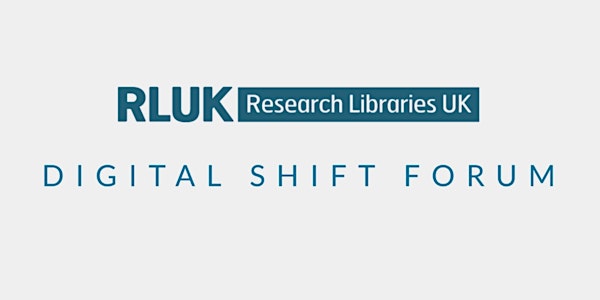
RLUK Digital Shift Forum - Claire Warwick, Durham University
RLUK’s Digital Shift Forum brings together colleagues to discuss the future of the digital shift in collections, services, and audiences.
Date and time
Location
Online
About this event
#RLUKDSF
These monthly seminars will include high-profile international speakers, from a wide variety of backgrounds and professions, who are at the forefront of current thinking around the digital shift. They will provide time and space for wide-ranging, inter-disciplinary discussions regarding the future of the digital shift, and will provide a springboard for cross-sector collaboration. Seminars are open and inclusive to all, and you do not need to belong to an RLUK member institution to attend or participate.
Managing the digital dystopia - Claire Warwick, Professor of Digital Humanities, Durham University
Digital is in danger of acquiring a bad rep. Over the last few months unprecedented numbers of people have become accustomed to living and working online, and not all of them enjoy it. They have found during the pandemic, the experience of interaction online, whether with other people, or with information is very different from what we do in person. And this experience is seldom compared favourably to physical, ‘real’ interaction. Thanks to the A level algorithm, all algorithms have come to be regarded with massive scepticism, to the extent that some local authorities have abandoned their use in welfare management. Social media is increasingly associated with deadly misinformation and hate speech, leading to boycotts by users, advertisers and even celebrities, bloggers and YouTubers. Yet, as librarians and information professionals know very well, digital delivery is ideal for certain types of information, such as journal articles or digital images of rare manuscripts. Digital allows us to interact with such materials in new and exciting ways. But how should we proceed, in an environment where our users may increasingly regard digital interaction and computational techniques with scepticism or even hostility? I’d like to explore some of these questions, based on the research I have done on the way that we interact with digital and physical information environments, especially in terms of emotion and affect.
****
This event will be held via Zoom. Attendees will be sent joining details the day before the event, and should check their junk folders if no email is received.
Suggested reading ahead of the event:
HEPI The New Realists- Student insight report (2019)
L. Dietz, C. Warwick, and S. Rayner, ‘Auditioning for Permanence: Reputation and legitimacy of electronically distributed novels’, Logos, 26/4 (2015), 22–36
L. Amoore (2020) Why 'Ditch the algorithm' is the future of political protest